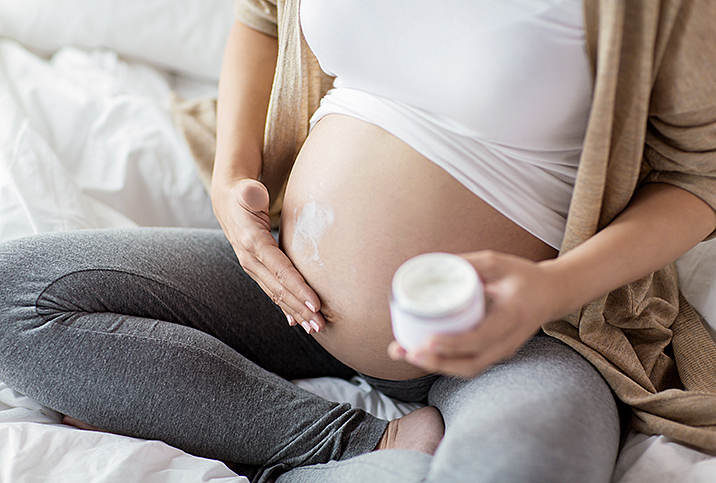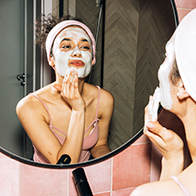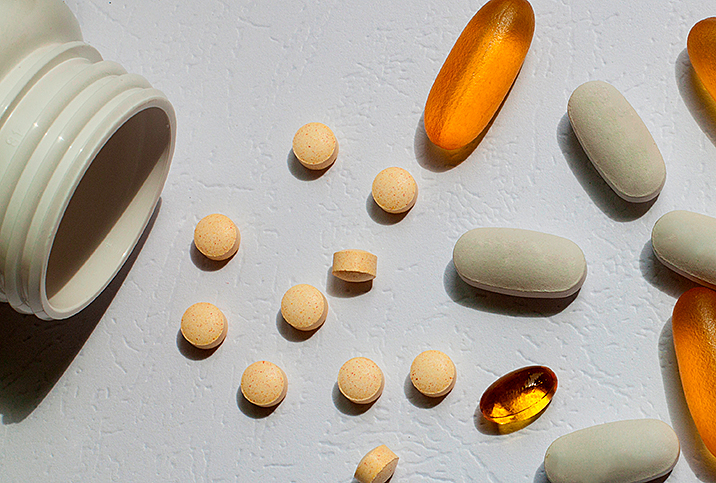How to Babyproof Your Skincare Routine When Pregnant and Breastfeeding

Changes to your skin while you're pregnant and breastfeeding are normal, and you might need to switch your skincare routine to accommodate these changes, because your skin has different needs and the products you're currently using might not be safe during this time.
While many skincare products are fine to use while you're growing and feeding a baby, there are some to avoid for the safety of you and your child. Skincare products are absorbed into the skin and a few can make their way into the bloodstream. Since your bloodstream supplies nutrients for both the placenta and breast milk production, it's good to keep the following information in mind.
Hormones and your skin
The hormones produced during pregnancy can have all kinds of effects on a person's skin, including dryness, acne and more. More than 90 percent of women experience significant and complex skin changes during pregnancy, according to a 2014 article published in the Journal of Family Medicine and Primary Care.
"During pregnancy, progesterone levels increase [and] this leads to a higher production in sebum oil, which can cause breakouts," said Najia Shaikh, M.B.B.S., founder and medical director of One Skin Clinic in London.
Another pregnancy-related condition is melasma, which is characterized by brown patches that usually appear on the face. It also makes skin more sensitive, so Shaikh recommended managing these issues by avoiding the sun, using SPF for protection and ensuring products are fragrance-free, without any harsh chemicals or exfoliants.
On the bright side, Shaikh said the pregnancy glow you hear about is real: Hormones can increase blood flow to the skin as well as help it retain more moisture.
Breastfeeding can cause dehydration that can make your skin dry and puffy, so, much like during pregnancy, it is vital to drink plenty of water.
Skincare products to be cautious about
"Many people are not aware that skin products can impact the fetus," stated Beth Goldstein, M.D., a board-certified dermatologist in Durham, North Carolina, and founder of Central Dermatology and the men's skincare company Get Mr.
The good news is that most products act locally and, therefore, produce minimal systemic levels, according to a 2011 article in the medical journal Canadian Family Physician. However, some ingredients, such as hydroquinone (a depigmenting agent) and tretinoin (a retinoic acid used to treat acne), are absorbed at higher rates than others and can get into the bloodstream, and your doctor may advise against their use while you are pregnant.
Research on hydroquinone use during pregnancy is extremely limited. A small 2007 study that looked at the effects of using skin-lightening products containing hydroquinone and highly potent steroids while pregnant found no difference in the main outcomes of pregnancy between skin-lightener users and nonusers. But the study suggested that "women using highly potent steroids, when compared with those who did not, had a statistically significant lower plasma cortisol level and a smaller placenta, and presented a higher rate of low-birth-weight infants."
"Based on available data, hydroquinone use during pregnancy does not appear to be associated with increased risk of major malformations or other adverse effects," stated the 2011 Canadian Family Physician article. "However, because of substantial absorption compared with other products, it is best to minimize exposure until further studies can confirm safety."
Similarly, data on the effects of tretinoin on a fetus are limited, and though the research does not indicate this topical medication can cause pregnancy-related complications, it is generally not recommended. Its effects during breastfeeding have not been studied.
"Retinol, common in acne treatments, and hydroquinone, a skin brightener, are skincare ingredients that should be avoided," Goldstein confirmed, adding that the acne treatment benzoyl peroxide is not known to be safe, either.
The issue with retinol or retinoids is that they are derivatives of vitamin A, too much of which can lead to birth defects, according to Shaikh. In sunscreens, she recommended checking for oxybenzone and avoiding this ingredient, as it is absorbed into the body and thought to disrupt hormones. However, like the other ingredients mentioned, research on this subject is insufficient.
While one study indicated glycolic acid is safe during pregnancy, the Food and Drug Administration (FDA) advises that it could make users more susceptible to sunburn, so it is being evaluated. While salicylic acid is safe to use for short periods, the American Academy of Dermatology Association (AAD) advises speaking to a dermatologist before using it.
The dearth of concrete studies on which skincare products are safe or unsafe for women who are pregnant or breastfeeding can be scary. Goldstein advised a cautious approach as she believes there may not be any definitive studies in the near future.
"The bottom line is to steer away from products not clearly known to be safe," she said.
Skincare products recommended by dermatologists
Fortunately, some products are known to be safe for you and your growing baby. Shaikh advised keeping your skincare routine during pregnancy and breastfeeding focused on protecting your skin rather than trying to fix the problems.
Hyaluronic acid, lactic acid, niacinamide and vitamin C are all safe to use. For safe sunscreen to avoid melasma, Goldstein recommended zinc oxide cream and topically applied clindamycin solution or lotion for acne during pregnancy.
Azelaic acid, which is used to treat rosacea and acne, has been proved safe in animal testing and is thought to be safe for use while pregnant, according to the AAD. However, with any acid, use the lowest concentration you can find to reduce absorption levels and avoid irritation to sensitive skin.
"Vitamin B is safe to use during pregnancy, so look to use products that contain this. It helps rehydrate the skin and reduces breakouts," Shaikh added.
You can also try coconut oil, which is a great natural moisturizer.
Helpful resources
One useful resource while breastfeeding is LactMed, a database of drugs and their known effects on breastfeeding moms provided by the U.S. National Library of Medicine. While the database should not be substituted for direct medical advice from your physician, it is a helpful guide when researching whether ingredients are safe for use while breastfeeding.
Another useful website is Infant Risk, which aims to help moms, lactation consultants and doctors evaluate safety risks to infants from medication exposure during breastfeeding. The American Academy of Dermatology also has helpful information about skincare during pregnancy.
Goldstein recommended bringing your daily skin products to your healthcare provider if you are attempting to become pregnant—and certainly at the beginning of your pregnancy—so you can discuss whether they are safe or not.
"If you are concerned about any ingredients in your skincare products, it's always best to get in touch with your dermatologist or doctor," Shaikh agreed.




















